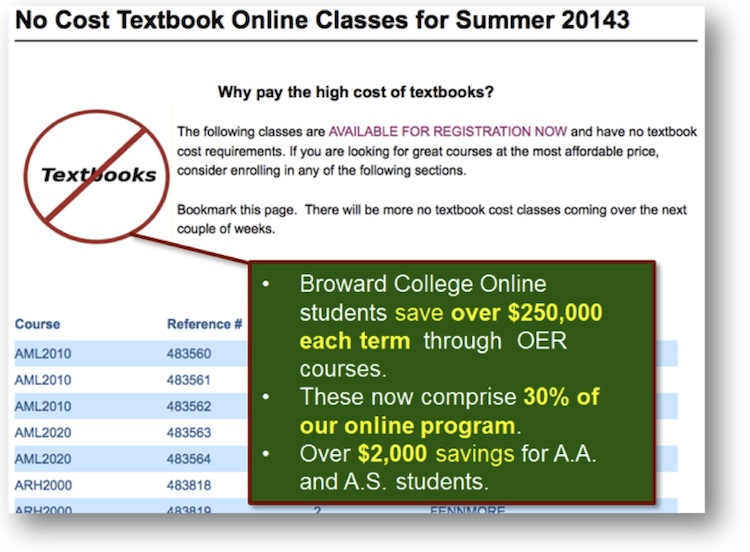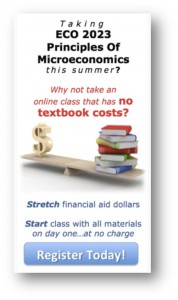This case study was originally posted in 2014. Source link here.
Diving into Open Educational Resources
by David Shulman, Ph.D, Campus President
Background
It is no secret that the costs of higher education and ballooning student indebtedness have become part of the national consciousness. In numbers, this fact is starkly represented by a rise in student loan debt from $240 billion in 2003, to a trillion dollars in 2014. Yes, you read correctly, one trillion dollars….and that is just for tuition. Moreover, the cost of textbooks and digital content in the affordability equation has socked students with price increases in excess of 80 percent.
Within the context of affordability, Broward College prides itself on the low cost of tuition; however, controlling external factors such as the increase in textbooks and materials is not feasible. After all, we have had very little influence on the publishing behemoths, let alone the secondary economies built around book rentals, used books, shared books, and even black-market copies until Clayton Christensen’s disruption theory model provided an Internet-enabled market solution that addresses these ancillary expenses. Indeed, three years ago Broward College Online, the virtual campus in our system, decided to take a stand and chart a new direction in quality courses and affordability by embracing the disruptive elements of Open Educational Resources (OER).
Why are we committed to OER and No-Cost Materials?

Affordable education is a deeply embedded value of Broward College, and the idea of taking the path less chosen through no-cost Open Educational Resources (OERs) was too good not to investigate. After all, if the learning outcomes could be demonstrated through mastery of competencies, why not try the OER approach and begin to chip away at that annual textbook cost of $1,234, one course at a time.
Of course student performance is always a factor, and the effects of high textbook costs often forces students to forgo the materials altogether, or not to not start class with the textbook due to insufficient funds, problems with correct editions, access code woes, and I could add several other impediments to learning that typically hit hard, especially at the start of each new course, which is the most critical juncture in charting student success.
Nevertheless, embedding OER and other cost-neutral ways of serving students is no easy feat for on-ground or online classes, however it is an essential 21st century approach to online learning and the necessity of embracing the emerging digital paradigm. Difficulties include new editions that need to be regularly ordered, and also courses often require redesigns to meet changing curricula. The latter is particularly challenging as the cycle of textbook changes has shortened over the past decade. As an online campus managing hundreds of courses each term, we are the direct and obvious beneficiaries that embedded OER and no cost content solutions offer.
Our commitment to OER is also an added efficiency in light of textbook changes being considered by the State of Florida that would require transparency in textbook information inclusive of posting details several weeks prior to the start of registration. Clearly OER provides huge advantages in dealing with the rigors of compliance with state mandated standards. In fact, Senators Dick Durbin (D-IL) and Al Franken (D-MN) have introduced legislation to mitigate costs by having textbooks accessible and free deemed the “Affordable College Textbook Act” to develop online textbook content that can be freely licensed and repurposed.
How did we get here?
Our journey started in 2012 with a decision to host an “e-Textbook & Digital Content Symposium.” This event provided a superb introduction to our College regarding OER and other emerging content delivery options. Faculty, neighboring institutions, and many vendors (AcademicPub, Apple, Cengage, Coursesmart, Courseload, Flat World, McGraw-Hill, Pearson) provided a view into the changes and trends in content ownership and delivery. The result of this signature event was the birth of Broward College Online’s commitment to OER and other zero cost course materials.
Over the subsequent two years, Broward College Online has progressively moved from the exploratory phase to building no textbook and no cost solutions for our master courses. We also contracted with Flat World Knowledge to use their library and authoring platform to embed OER and develop custom e-books, primarily in general education courses.
How are we doing?

Broward College Online is witnessing a significant impact in student success and enrollment as our OER and no-cost catalog grows. During the Winter/Spring 2014 terms, students saved over $250,000 and Summer 2014 courses are running at close to 30% OER adoption. Even more encouraging is that retention rates are positive in these offerings, and enrollment is robust. Moreover, no cost and textbook free courses are now routinely advertised to prospective enrollees through LMS announcements, website advertising, and social media. Every new OER or no-cost material course that emerges from our course development process is heralded through these media to increase awareness of these courses and to drive enrollments to Broward College Online offerings.
What have we learned?
Building quality OER and no material cost courses is not a simple task. Part of the learning curve at Broward College Online has been the realization that the process needs structure and support. Our approach has now evolved to include professional development and the services of our campus’ full time librarian. Apart from in-house training, Broward College Online also contracted with Lumen Learning to conduct OER workshops for staff and developers, as well as from Flat World Knowledge.
There are certainly pain points in the process, including the difficulty of replacing commercial adaptive and artificial intelligence technologies. Additionally, some content areas are simply far more intense and difficult to design as OER-based courses, such as Mathematics, Anatomy and Physiology, and Computer Science.
Where are we headed?
Our most ambitious project launched in Summer Term 2014, as we started an accelerated A.S. and A.A. program built around OER. The savings to a graduate of either degree will be over $2,000. In addition, Broward College Online will continue to expand our catalog of OER and no-cost textbooks and materials, with an eye towards realizing these outcomes:
- Increased student engagement, retention and completion.
- Students starting each online course with all requisite materials.
- Financial Aid awards stretching further through the elimination of textbook and material costs.
- Elimination of all publisher access codes, which currently provide significant help desk cases and obstacles (financial and logistical) for students.
- Provisioning mobile solutions that seamlessly enable anywhere, anytime access to e-textbooks and digital content where possible.
- Provisioning print on demand and/or hard copy options to ensure students have all media formats available.
- Increasing use of Open Educational Resources (OERs) to provide high quality and affordable educational materials licensed to be used freely through Creative Commons licensing.
- Almost every new course will be developed or redesigned by Broward College Online with OER.
- Launching a B.A.S. Supervision and Management degree in Fall 2015 with no-cost OER and digital content.
- Effectively managing textbook and material needs for Broward College Online’s local and state students, as well as for our out-of-state and global learners.
We have just left the starting gate with this new initiative, and are on track to save Broward College Online students over three-quarters of a million dollars this academic year alone. When this initiative is combined with the lowest tuition in the state, we see the value of our brand and credentials increasing in quality and decreasing in cost, which is our ultimate vision.
David Shulman,
Ph.D.Campus PresidentBroward College Online – Florida’s Global CampusBroward College225 E. Las Olas BoulevardFt. Lauderdale, FL 33301
e-Mail: dshulman@broward.edu
Phone 954-201-7933
Fax 954-201-7937
Web: online.broward.edu

